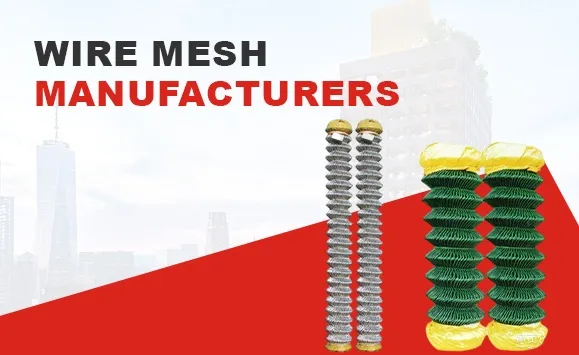
- Mobile Phone
- +8613931874955
- sales@cntcmetal.com
Top Wire Mesh Manufacturers for Quality and Innovation in Industrial Solutions
Understanding the Role of Wire Mesh Manufacturers in Modern Industry
Wire mesh plays a crucial role in a variety of industries, ranging from construction and mining to agriculture and food processing. The versatility and durability of wire mesh make it an essential component for numerous applications, and wire mesh manufacturers are the backbone of this industry. This article delves into the significance of wire mesh manufacturers, exploring their processes, types of wire mesh, and the industries they serve.
The Manufacturing Process
The production of wire mesh involves several steps, beginning with the selection of high-quality raw materials. Manufacturers typically use stainless steel, carbon steel, or other alloys, each chosen based on the specific requirements of the intended application. After selecting the material, it undergoes a process of drawing and forming into wire.
The next step is the weaving process, where the wire is interlaced to create a mesh pattern. This can be done through various methods, including welded, woven, and stamped techniques. Each method results in a different type of wire mesh, with unique properties suited for specific tasks. Once the mesh is created, it's often treated with coatings or finishes to enhance its corrosion resistance or aesthetic appeal.
Types of Wire Mesh
Wire mesh manufacturers offer a broad variety of products. Some of the most common types include
1. Welded Wire Mesh This type consists of perpendicular wires that are welded together at each intersection. It is known for its strength and stability, making it suitable for construction, fencing, and reinforcement in concrete.
2. Woven Wire Mesh Woven wire mesh is made by interlacing wires over and under one another, akin to fabric weaving. This type is often used in applications where filtration is essential, such as in food processing and chemical industries.
3. Crimped Wire Mesh In this version, the wire is crimped before weaving, which provides additional strength and rigidity. It is commonly used in mining and quarry applications.
wire mesh manufacturers

4. Expanded Metal Mesh Produced by cutting and stretching a sheet of metal, expanded metal mesh creates a strong yet lightweight material used in stairs, walkways, and safety barriers.
5. Perforated Metal Mesh This type of mesh features a pattern of holes and is used extensively in architectural applications, ventilation, and sieving processes.
Applications Across Industries
Wire mesh finds applications across numerous sectors. In construction, it is vital for reinforcing concrete, providing stability and strength. Agriculture uses wire mesh for fencing to protect crops and livestock while also serving as support structures for plants like tomatoes and cucumbers.
In the food processing industry, woven wire mesh is crucial for filtration and sorting. It ensures hygiene and efficiency in processing operations while maintaining the integrity of the product.
Additionally, wire mesh plays a significant role in industrial filtration systems, where it is used to create barrier mechanisms that separate solids from liquids or gases in processes ranging from chemical manufacturing to wastewater treatment.
The transportation industry also relies on wire mesh for safety barriers, cargo nets, and even certain aspects of vehicle construction. Furthermore, the aesthetic appeal of decorative wire mesh has found its way into architecture and art, showing the material's versatility in design.
Conclusion
Wire mesh manufacturers are essential contributors to modern industry, supplying a wide range of products that serve diverse applications. Their ability to create customized solutions allows industries to meet specific needs effectively. As technology advances and industries evolve, the demand for high-quality wire mesh will undoubtedly continue to grow. Thus, wire mesh manufacturers play a critical role not only in producing these materials but also in innovating and adapting to the ever-changing landscape of various sectors. Their commitment to quality and performance ensures that wire mesh remains a reliable and essential component across multiple industries.
share:
-
Yard Sign Stakes: Reliable Guardians of Outdoor SignsNewsAug.04,2025
-
Wall Ties: Invisible Guardians of Building StabilityNewsAug.04,2025
-
Resilient Web: The Super Guardian Power of Concrete MeshNewsAug.04,2025
-
Masonry Accessories: A versatile assistant on building foundationsNewsAug.04,2025
-
Iron Binding Wire: the 'invisible reinforcement specialist' in the fields of architecture and industryNewsAug.04,2025
-
Dynamic Spring: The diverse functions and excellent performance of Wire Tension SpringNewsAug.04,2025
-
Your Source for Concrete Wall Ties and Masonry AccessoriesNewsJul.10,2025



















